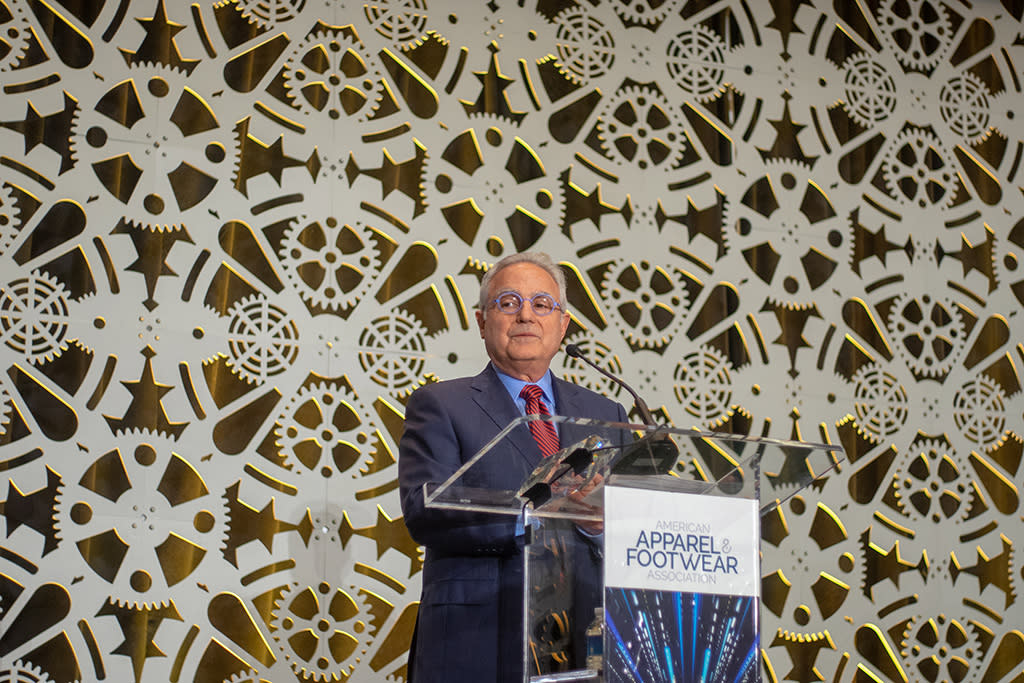How Will the Trade War End? Where Will Shoe Brands Go for Sourcing? And More Crucial Questions Answered at the AAFA Summit

More than 200 footwear and apparel executives convened in Washington, D.C., this week for the American Apparel and Footwear Association Executive Summit.
As fashion firms keep a close watch on the trade discussions between President Donald Trump’s administration and Beijing, the looming trade war was unsurprisingly top of mind for attendees.
Related stories
These Are the Countries That Stand to Benefit From the US-China Trade War
Industry Leaders React Positively to Trump's Delay of Tariff Hike
US-China Trade Deal Outline Reportedly in the Works One Week Before Deadline
To that end, a range of speakers — including Michael Evans, Alibaba president; Steven Kolb, CFDA president and CEO; Xia Ding, president of international fashion at JD.com; Ted Dagnese, chief supply chain officer at Lululemon Athletica; — sought to bring clarity to some of the key issues impacting retail supply chains right now.
Here, we round up six big takeaways from the summit.
On the viability of tariffs:
“Tariffs don’t work. Our industry got tariffed in the 1930. If you read the history books, they will tell you, tariffs were the catalyst for the Great Depression. And, what was the reason for tariffs? To protect footwear and apparel manufacturing in America? We did a great job. 97 percent of all apparel is made off-shore. 98 percent of footwear is made off-shore.” — Rick Helfenbein, president and CEO, AAFA
On whether JD.com will launch private label like Amazon:
“There’s a lot of internal debate within our organization about how important private label is to us. What it will come down to is: We are the platform. Our job is to bridge brands with consumers. There’s many things we’re good at and there are many things we’re not good at such as design, supply chain [and] brand marketing. Certain categories, we trying stay from such as private label. Certain categories, we have a good capability for it so [we do it]. We do not have ambition to do really big private label.” — Xia Ding, president of international fashion at JD.com
On how the trade dispute is impacting Lululemon:
“We’ve been fortunate — maybe a little dumb luck. Our spend in China is single digits. So we’ve been somewhat isolated — in a good way — from the escalating trade talks. But, we have made some adjustments. A lot of our partners that have factories in China, also have them in all of the other countries you would imagine. We’re extremely thoughtful about pulling out of a factory.” — Ted Dagnese, chief supply chain officer at Lululemon Athletica
On moving manufacturing to parts of Africa:
“There’s a lot of interest and desire. Some of our peers have taken pretty aggressive steps in that direction, particularly in Kenya and Ethiopia and North Africa and Egypt, which are a little more established. But it’s the infrastructure that’s missing. The hold up isn’t the intent or the interest. The hold up is the fact that the infrastructure isn’t there. I strongly and fundamentally believe that the infrastructure will get there. Until that infrastructure is built in, we’re restricted from going although we have the desire to do so.” — Rob Sinclaire, president of global supply chain, Global Brands Group
On how the trade dispute will end:
“Yes, I think we will have a deal with China. I think that the deal will include a provisions not only what I call a shopping list — buying more U.S. products and services. It will include an enforcement mechanism and structural reform. But it’s not going to be a perfect deal. What I would use to assess the deal is, ‘Have we attained meaningful commitments in each of these areas … With these deals, you’re not going to get everything you want.” — Wendy Cutler, VP and managing director, Asia Society Policy Institute, Washington, D.C.
On making sense of the trade war:
“If you talk to anyone in Congress, they all agree that China is a bad actor and we need to do more to ensure that China plays by the rules and so forth. This is certainly something you hear from politicians in both chambers and both parties. But many of them will turn around and challenge the tools that are used. There are a lot of people that dislike the tariffs that the U.S. imposed and there are people that dislike the tariffs that have been triggered with retaliation … We find a lot of angst about tariffs. The comment I hear a lot from our members of ours and of Congress is that we’ve weaponized tariffs and we’re in danger of normalizing tariffs.” — Steve Lamar, EVP of AAFA
Sign up for FN's Newsletter. For the latest news, follow us on Facebook, Twitter, and Instagram.


